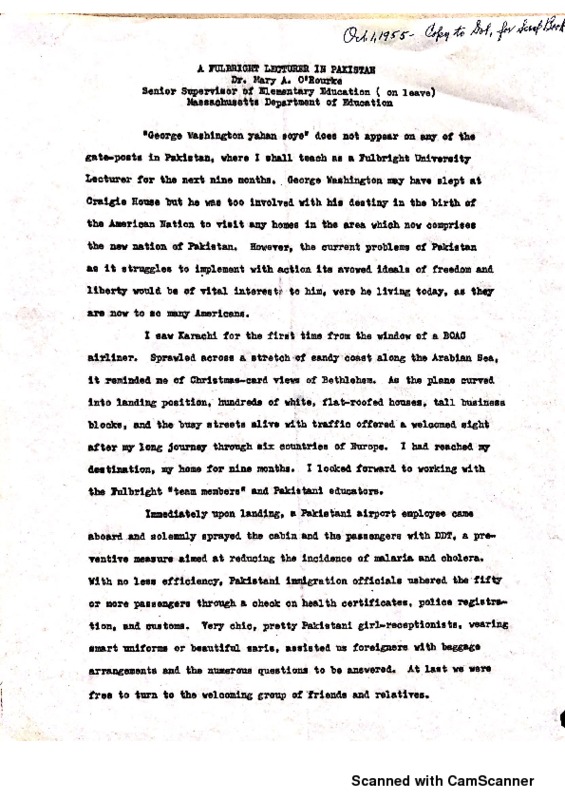A Fulbright Lecturer's Article in the Boston Globe

"Toting a full-length coat purchased in Rome, while wearing a summer suit of silk and wool, had seemed sensible enough until the door of the plane had been opened in Cairo where we stopped for two hours at midnight. The dark, desert warmth, while not uncomfortable for me in a sleeveless blouse made me wonder if I would ever exist in Karachi until my supply of cotton dresses, traveling by sea freight, would arrive. The same thought occurred as I rode with the Bellizias toward their Karachi home.
My personal worry about clothes ceased abruptly as we passed miles of the most poverty-stricken homes I have ever seen. The families living in the most miserable, make-shift huts are refugees who entered Pakistan from India since partition in 1947."
During her time as a Fulbrighter, Dr. Mary O’Rourke was invited to write a series of four articles for the Boston Globe sharing her experiences with a hometown audience. In her October 1, 1955 article the last two paragraphs of the second page make clear the influence Pakistan had on both O’Rourke herself as well as the power it had to affect those back home. A fashionable woman, O’Rourke valued material possessions and had purchased some exquisite clothing throughout her journey to Karachi, in addition to the trunks of clothing from the US which were to arrive in Karachi shortly after she did. With this in mind, when she arrived in Pakistan’s summer heat, O’Rourke begins to worry about, “how [she] would ever exist in Karachi until [her] supply of cotton dresses… would arrive.” However, she quickly begins to understand that things like clothing were not a top priority in her new home, which at the time had been deemed one of the most underdeveloped countries in the world.[2] What had been a “need” for more or different clothing is called quickly into question as she became immediately aware of the poverty of the people among whom she would be living. As this article makes clear, it was during her first few hours in Pakistan that “[her] personal worry about clothes ceased abruptly as [she] passed miles of the most poverty stricken homes [she had] ever seen.” In addition to highlighting her own transformation, this article suggests O’Rourke’s willingness to write about and publish this intimate look at her Pakistani experience in a major US newspaper, thereby having the potential to educate, influence and challenge the beliefs of those back in Boston.
[2] Cohen, "Economic Development in Pakistan," 1-12.